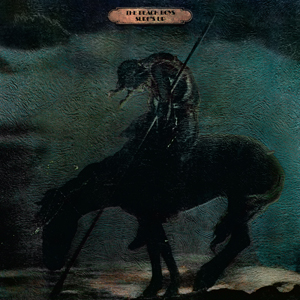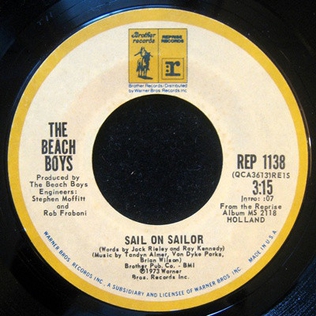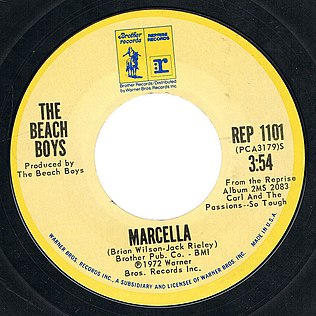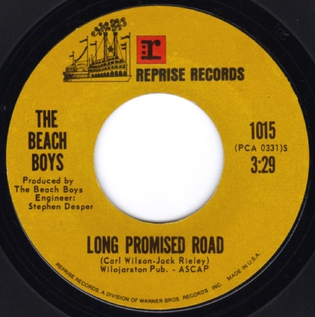
Holland is the 19th studio album by American rock band the Beach Boys, released January 8, 1973 on Brother/Reprise. It is their first album recorded without Bruce Johnston since 1965, their second with Blondie Chaplin and Ricky Fataar, and their final studio album created under the de facto leadership of Carl Wilson and manager Jack Rieley. The LP was originally packaged with a bonus EP, Mount Vernon and Fairway, which consisted of a 12-minute fairy tale written and produced by Brian and Carl Wilson.

Surf's Up is the 17th studio album by American rock band the Beach Boys, released on August 30, 1971 on Brother/Reprise. It received largely favorable reviews and reached number 29 on the U.S. record charts, becoming their highest-charting LP of new music in the U.S. since 1967. In the UK, Surf's Up peaked at number 15, continuing a string of top 40 records that had not abated since 1965.

Carl and the Passions – "So Tough" is the 18th studio album by American rock band the Beach Boys, released May 15, 1972 on Brother/Reprise. The album is a significant musical departure for the band and is the first to feature the Flames' Blondie Chaplin and Ricky Fataar as additions to their official line-up. It sold poorly and was met with lukewarm reviews, but later gained stature as a cult favorite among fans.

"Sail On, Sailor" is a song by American rock band the Beach Boys from their 1973 album Holland. It was written primarily by Van Dyke Parks and Brian Wilson with Ray Kennedy, Tandyn Almer, and Jack Rieley. The lead singer on the song is Blondie Chaplin, making this one of the band's few well-known songs not sung by Mike Love, Brian Wilson or Carl Wilson. The song was released as a single in 1973, backed with "Only with You", and peaked at No. 79 on the Billboard singles chart. A 1975 reissue charted higher, at No. 49.

"Forever" is a song by American rock band the Beach Boys from their 1970 album Sunflower. It was written by Dennis Wilson and Gregg Jakobson. Dennis sang lead vocal. His brother Brian assisted with the arrangement.

"Surf's Up" is a song recorded by the American rock band the Beach Boys that was written by Brian Wilson and Van Dyke Parks. It was originally intended for Smile, an unfinished Beach Boys album that was scrapped in 1967. The song was later completed by Brian and Carl Wilson as the closing track of the band's 1971 album Surf's Up.

"'Til I Die" is a song by American rock band the Beach Boys from their 1971 album Surf's Up, subsequently issued as the B-side of the single "Long Promised Road". With autobiographical lyrics about death and hopelessness, it is one of the few songs in which both the words and music were written solely by Brian Wilson. An extended mix of the original recording, created by engineer Stephen Desper, was included on the 1998 Endless Harmony Soundtrack.
"Funky Pretty" is a song by American rock band the Beach Boys from their January 1973 album Holland. Themed around astrology, the song was written by Brian Wilson, Mike Love, and Jack Rieley. Carl Wilson explained that the song was quickly recorded in a "spontaneous flurry". Brian was an active participant in its production, a rare occurrence at the time. In April 1973, it was issued as the B-side to their single "California Saga/California".

"Disney Girls (1957)" is a song by American rock band the Beach Boys from their 1971 album Surf's Up. It was written and sung by Bruce Johnston, who also plays upright piano, Moog synthesizer, and mandolin. Johnston later rerecorded the song for his 1977 solo album, Going Public.

"Cool, Cool Water" is a song by the American rock band the Beach Boys from their 1970 album Sunflower. It was written by Brian Wilson and Mike Love and later issued as an A-sided single in March 1971.

"Don't Go Near the Water" is a song by American rock band the Beach Boys from their 1971 album Surf's Up. Written by Mike Love and Al Jardine, the song puts an ironic, ecological spin on the traditional Beach Boys beach- and surf- based songs: instead of enjoying surfing and other fun activities, this time the listener is advised to avoid the water for environmental reasons.
"A Day in the Life of a Tree" is a song by American rock band the Beach Boys from their 1971 album Surf's Up. It was written by Brian Wilson and the group's manager Jack Rieley, who also performed lead vocal. The lyrics were inspired by Wilson's feelings toward environmental pollution.

"Marcella" is a song by the American rock band the Beach Boys from their 1972 album Carl and the Passions – "So Tough". Written by Brian Wilson, Jack Rieley, and Tandyn Almer, the lyrics were inspired by Wilson's fixation with a local massage therapist. It is the last song to feature Bruce Johnston during his original tenure in the band.

"Long Promised Road" is a song by the American rock band the Beach Boys from their 1971 album Surf's Up. It was written by Carl Wilson and Jack Rieley. Aside from a few guitar instrumentals written in the early days of the band and collective co-writing credits, the song is Wilson's first solo composition, and he plays all of the instruments himself.
"Take a Load Off Your Feet" is a song by the American rock band the Beach Boys from their 1971 album Surf's Up. It was written by Al Jardine, Brian Wilson and Gary Winfrey.
"Student Demonstration Time" is a song by the American rock band the Beach Boys from their 1971 album Surf's Up. It is an altered version of Jerry Lieber and Mike Stoller's "Riot in Cell Block Number 9" with new lyrics by Mike Love.
"Sound of Free" is a song performed by American musicians Dennis Wilson and Daryl Dragon that was written by Wilson and Mike Love. It was released by Stateside Records as a British-exclusive single on December 4, 1970. The B-side was "Lady". In 2013, "Sound of Free" was officially released on CD for the first time on the Beach Boys' box set Made in California.
"Loop de Loop (Flip Flop Flyin' in an Aeroplane)" is a song by the American rock band the Beach Boys that was written by Al Jardine, Brian Wilson, and Carl Wilson. It was originally recorded between the late 1960s and 1970s. In 1998, Jardine finished the song for its release on Endless Harmony Soundtrack.
"My Solution" is a song by the American rock band the Beach Boys that was recorded during the early sessions for their 1971 album Surf's Up. It is a novelty Halloween song that features Brian Wilson doing an impression of Vincent Price over a descending chord progression and test-tube sound effects. The recording was officially released on the 2021 compilation Feel Flows.
"Child Is Father of the Man" is a song by American rock band the Beach Boys that was written by Brian Wilson and Van Dyke Parks. It was originally recorded for the band's never-finished album Smile. In 2004, Wilson rerecorded the song for Brian Wilson Presents Smile. In 2011, the Beach Boys' original recording was released on The Smile Sessions.













